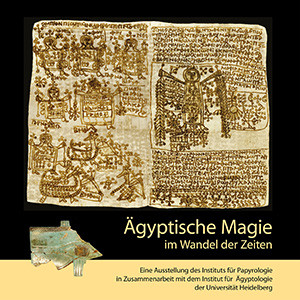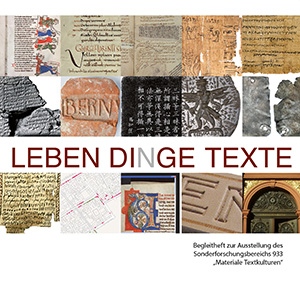Theis, Christoffer
Ägyptische Magie im Wandel der Zeiten: Eine Ausstellung des Instituts für Papyrologie in Zusammenarbeit mit dem Institut für Ägyptologie der Universität Heidelberg
The institute for Papyrology of the University of Heidelberg is the proud owner of one of the world’s most significant corpora of magical papyri. The small but excellent collection of Coptic parchments, most of which also include drawings, probably originating from around the beginning of the second millennium. Already in 1934, this collection was presented together with a codex containing the legend of Cyprian in the volume “Griechische, koptische und arabische Texte zur Religion und religiösen Literatur in Ägyptens Spätzeit” edited by Adolf Grohmann and Friedrich Bilabel. This volume announced the then-recent acquisition of two unique grimoires – one of which had been considered lost since 1945. One of the most famous scholars in this domain, P. Angelicus Kropp, had previously been able to publish a text of an earlier version of the other grimoire, in 1966; P. Heid. Kopt. inv. 686 (before: P. Heid. inv. 1686); the second grimoire, however, had been believed to be lost forever, with no earlier versions known of.
Leben Dinge Texte: Begleitheft zur Ausstellung des Sonderforschungsbereichs 933 „Materiale Textkulturen“
The exhibition "LEBEN DINGE TEXTE" (LIFE OBJECTS TEXTS / LIVING TEXT) presents artefacts that are inscribed. The exhibits originate from societies before the invention of printing: cuneiform script clay tablets from Mesopotamia, ancient graffiti, magical papyrus amulets, stamped roofing tiles, a dog leash superscribed with gemstones. Such "script bearing" artefacts can help investigate how the writing material affects the meaning of the text and vice versa. Furthermore, they illustrate that writing was not only for reading, but also associated with acts and rituals.
With this exhibition, the Collaborative Research Centre (SFB) 933 "Material text Cultures" presents intermediate results of its research. SFB 933 is funded by the Deutsche Forschungsgemeinschaft (German Research Foundation) and unites 50 researchers and scholars of Heidelberg University and Hochschule für Jüdische Studien Heidelberg.




